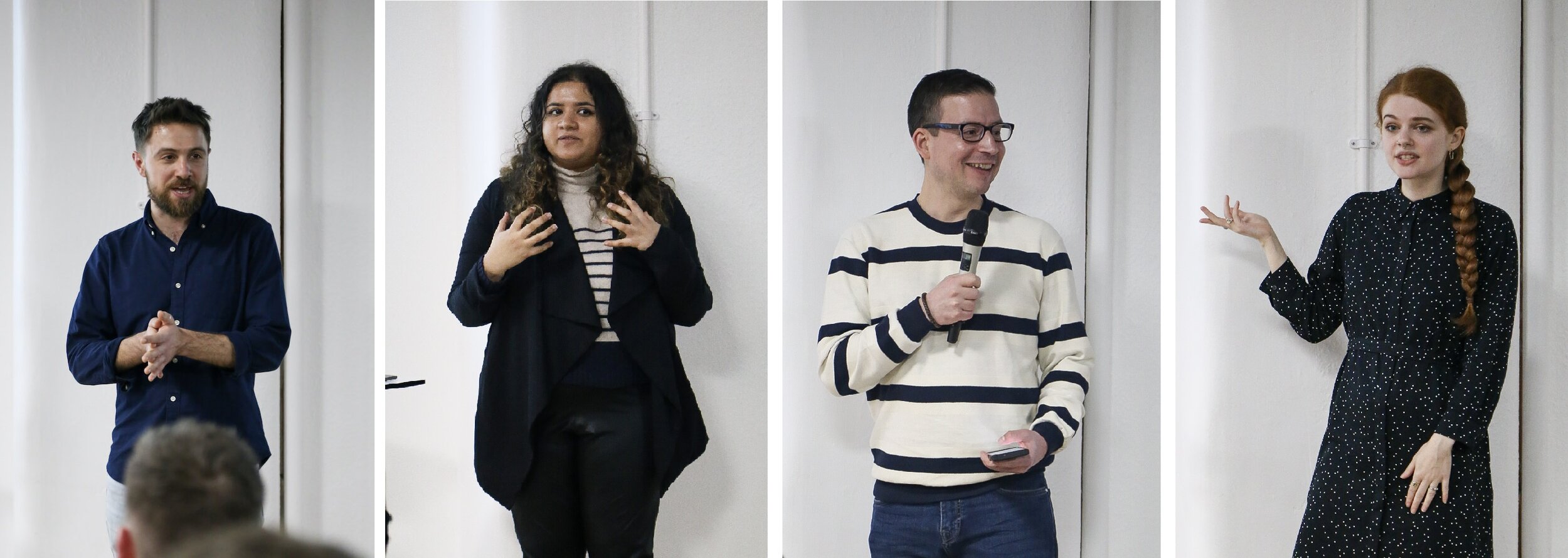Data for Good (believe it or not)
Written by Alina Kadyrova
If you listen to our podcasts, you know that we talk a lot about data for bad. Facebook is experimenting on people, someone is selling your personal data, websites are spying on you – nothing new here. There is a lot of evil tech around us – that’s why celebrating tech for good and meeting people that are doing something, which does not violate your privacy is great.
At our February event, we talked about how data is being used for good. We run this event together with our friends from Open Data Manchester, a community interest company advocating for responsible, transparent and intelligent data use. We’ve got four speakers at the event: Sam Milsom from Open Data Manchester, Hera Hussain from Open Contracting, Pete Sherlock from BBC Shared Data Unit and Annie Gouk from Reach.
Sam Milsom, Hera Hussain, Pete Sherlock and Annie Gouk
Sam Milsom from Open Data Manchester started his talk from reminding us that the data is neither good or bad until people use it. Using the data also is not equal to ‘telling a meaningful story’: one can associate per capita cheese consumption and a number of people died by becoming tangled in their bedsheets. Correlated, right? Related though? Good question, but just in case – be careful with that cheese! (to explore more weird correlations, look at Tyler Vigen’s website).
The beauty and danger of data is that it is very multifaceted. Depending on which ‘face’ you use, the story you are telling differs. That’s why transparency and responsible data use is important. If you are into data exploration - Open Data Manchester runs data digging events where a community of people explores the data together, check out their website and subscribe for their newsletter to get updates.
Transparency of data use and replicability cause a lot of discussions among, for example, scientists. A lot of scientific studies are difficult to reproduce using the same data and method, which raises a lot of validity questions, especially in fields of medicine and psychology. This The Conversation article explores why lack of replication is good for science.
The next speaker, Hera Hussain, also talked about her work with the open data and it is being used to bring transparency to the public sector. For example, Hera spoke about how reviewing the funding of the school meals in Bogota revealed a huge overpay of the government and higher than usual prices charged by a few monopolist companies. Changing that processes led to a new system with fair prices and 12 different meals providers, as well as saved budget (link to The Guardian story about it). Another example of using data helped revealing striking differences in public spending on providing supported accommodation for teenagers, ranging from £2000 a month to £28000 a month, for the same services. You can read about this here.
Continuing the topic of data and the public sector, our next speaker, Pete Sherlock for BBC Shared Data Unit, talked about some weird things happening on the Council’s websites and how they are not as innocent as you think they are. For example, you can find ads for new iPhone sales on some of the pages providing information about the benefits (here is a link to BBC News about it).
Many of these websites pages would also collect information they did not ask permission for. When Pete and his colleagues brought it to the councils, their reply was that a) it helps to get additional money to maintain the website and b) they didn’t know it’s illegal. There are many reasons for it happening – tight budgets and a lot of expectations from the public service, combined with the general rigidity of the sector and settled practices that no one wants to change. Data, however, must be used responsibly by the organisations dealing with sensitive subjects and grounding its operations on people’s trust.
Our last speaker for the night was Annie Gouk, deputy editor of data and multimedia at Reach, which is an online and offline newspaper, magazine and news publisher. Annie talked about how she uses the data to write local news and infographics that help people exploring their local areas and other areas in the country. Examples include a tool where people can explore school funding in their local area or universal credit infographics. Follow Annie on Twitter for more stories and listen to her podcast North in Numbers.
The event was great. I think the best part of it was that the speakers showed how powerful the data is and how much good (or bad) you can achieve with it. This month we continue exploring data for good and we will talk about artificial intelligence and bots for good. Join us at the next event on March 25 at The Federation. Sing up on Meetup.


